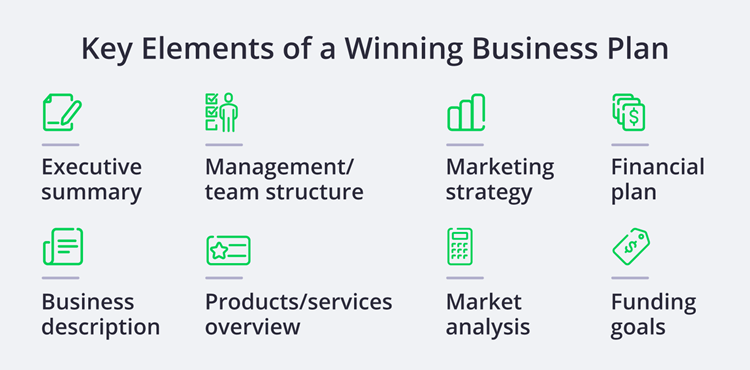Every tech startup faces business risks such as funding issues to legal troubles. Here are some of the most common startup business risks for tech companies and how to protect against them.

Even for the most seasoned entrepreneurs, starting a tech company can be difficult. It’s no wonder that startups often fail. From insufficient cash flow to poor team management, anything can cause a promising tech startup to fail.
Although you can take risks, you need to avoid these common entrepreneurial hazards to increase your chances of success. Here are six types of risks that business owners should know about and how to protect your business from hidden threats.
1. Underestimating the Competition or Misjudging Market Demand
Successful startups often fill gaps in the market, but many tech startups misjudge market demand and underestimate their competitors.
That is why it is important to conduct market research when starting a tech company. This involves collecting and analyzing information about consumer preferences, competition, and trends in your industry.
You do not need to hire a marketing consultant to do this. Here are some low-cost ways to reduce your risk of competition by conducting your own market research:
- Search Google and read reports from reputable organizations to follow trends in your market
- Send potential customers an email survey about their product preferences
- Use social media polls to ask your target audience what they want from your brand
- Request feedback from customers
- Learn the competition and keep track of their marketing efforts, product updates, etc.
Based on the results of your market research, the market may be oversaturated. In an overcrowded market, it’s hard for tech startups to succeed unless they really disrupt the field.
If you are facing a highly competitive or saturated market, please look for market alternatives and recheck your products. Identify your niche market early and find out how your startup is different from other companies in the industry.
2. Poorly Defined or Poor Product or Services
Although you may know your product very well, it is important to know who you are selling to.
Tech startups need to clearly define what their product is, what it does, and who needs it. This is what potential clients and investors need to know.
A good way to define your product is to start with the Minimally Viable Product (MVP). MVP is a new product that has very basic functions when it is launched and can be used as a way to measure consumer interest.
If tIf the startup is successful, you can use the knowledge you learned during the initial startup to develop your MVP. If the product is not feasible, you will save much-needed funds.
One of the best secrets for technology startups is to write a business plan from scratch. Even if you don’t need to raise funds, a business plan is still a good idea. It will serve as a roadmap for the future of your business.
Your business plan should include:
- An executive summary
- A description of your business
- A list of your products and services
- What sets you apart from the competition
- Market research/SWOT analysis
- Marketing strategy
- Business model, management and team structure
- Financial plan
- Funding goals (if any)
It can be tempting for a startup to bring a product to the market. You must resist the temptation and spend time developing the product. Product quality can affect your company’s reputation, and inferior products may even lead to lawsuits.
If your technology startup provides services, you may need to consider professional liability insurance. Also known as errors and omissions insurance, this insurance will protect you from claims for negligence, mistakes, and oversights.
To manage the risks surrounding product development, you may consider product liability insurance. You can protect against claims that your product causes personal injury or property damage. This insurance is generally included as a supplement to the general liability insurance policy.

3. Cash Flow Problems
Running out of funds is a big risk for startups. More than 80% of small businesses close due to cash flow problems.
Ensure that you accurately forecast your expenses to address this risk. If your operating costs are higher than your budget allows, you need to make adjustments.
It is necessary to carry out a financial plan in the initial stage of a tech startup. Your financial plan should include the following information:
- Your total budget
- Operating expenses (rent, salaries, inventory, etc.)
- Current cash flow and income statements
- Capital raised
- Debts and loans
- Financial projections
The financial plan should be included in your business plan. If you are looking for financing, banks and venture capital firms will want to review your financial plan to understand why your funds are needed. In addition to good accounting practices and careful record-keeping, a detailed budget can be of great help.
In the early stages of a business, capital conservation is the key. Keep an emergency fund to cover unexpected expenses and don’t rush to pay off debts. It’s better to pay off low-interest loans slowly, rather than paying your entire budget at once.
4. Cyber Threats
Data breaches or cyber-attacks are a threat to any business. But tech startups that store or process sensitive data face higher risks.
The cost of a data breach can be high. If your business is tampered with, you can suffer huge financial losses. Also, if you are accused by a customer of allowing a data breach, you may face costly lawsuits.
To protect your startup from cyber threats, please consider purchasing cyber liability insurance. There are two types of cyber liability insurance: first-party and third-party.
If your own network or system is affected, First Party Network Liability Insurance can protect your business and help pay for the following fees:
- Customer notifications and credit/fraud monitoring services
- Investigating/correcting security weaknesses
- Public relations costs
If a customer sues you for a breach of their business data, third-party cyber liability insurance will pay for the legal fees, which include:
- Attorney fees
- Settlements or judgments
- Other court costs
5. Team Troubles
Countless startups have failed because their team didn’t have the right expertise or received advice from troublesome sources. Your team members and management are critical to the success of your startup, so be strategic when hiring.
Work with talented and professional people to help your business develop and lead the market. Help connect with successful startup founders and solicit feedback. If you are starting your first business, find a high-level person who can show you the skills you need to grow your business.
Directors and Officers (D&O) insurance policies can also help you attract and retain top leadership. If the co-founders, board members, and managers make decisions that lead to financial losses on behalf of the company, D&O Insurance will protect them.
Directors and officers insurance covers litigation related to:
- Mismanaged funds
- Employee complaints
- Slander, libel, and copyright infringement claims
- Failure to follow company bylaws
- Regulatory compliance
In order to protect your business from employee lawsuits, you may also consider purchasing liability insurance for employment practices. This can help cover claims related to:
- Mismanaged benefits
- Sexual harassment
- Wrongful termination
- Discrimination
- Breach of employment contract
A common mistake startup owners make is asking the core team to do too much, or for you and your partners to get too involved in every decision. Either way, important details can go unnoticed.
Train your team to make sure you don’t miss out on important information. Make sure someone quickly finds potential problems from a bird’s eye view.
6. Protecting Intellectual Property and Other Legal Issues
Technology startups can own a lot of intellectual property. If you work with subcontractors, information such as patents and product designs may be accidentally exposed.
In order to legally protect your intellectual property, please ensure that you have a written subcontractor agreement, requiring all subcontractors you cooperate with to sign the agreement. It should include:
- Work scope and payment details
- Non-compete and non-disclosure terms
- Ownership rights
- A warranty clause
- A hold harmless clause or agreement
- Insurance requirements
To protect your business from the theft of intellectual property or other crimes by employees, you may need to consider fidelity bond insurance. The insurance has two forms: first-party and third-party
First-party fidelity bond insurance covers costs related to:
- Employee theft or embezzlement from your company
- Employee fraud against your company
- Employee forgery that affects your company
Third-party fidelity bond insurance will pay costs related to:
- Employee theft from a client
- Employee fraud against a client
- Employee forgery that affects a client
New business owners may not understand all the risks and legal requirements of their business. It is helpful to find a lawyer or other trusted advisor who can provide legal advice on issues such as copyright infringement or customer harm.
If your business is involved in litigation, having a general liability insurance policy can protect you from the following common situations:
- Client property damage
- Client injuries
- Advertising injuries like slander, libel, and copyright infringement
If you own or rent a company office or vehicle, your business can also benefit from commercial property insurance and commercial auto insurance.
It is easy to focus on day-to-day operations so that you forget the potential risks of startups. But successful companies consider these common entrepreneurial risks when formulating risk management strategies.
No matter what risks you face, the right commercial insurance is an important part of an effective risk management strategy. With careful planning and proper protection, you can increase the chances of success for tech startups.
